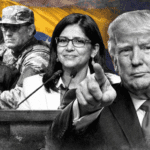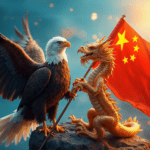The United States has long been a dominant force in shaping global affairs, influencing international institutions, and maintaining security alliances across the world. However, the Trump administration’s second term has marked a significant shift toward disengagement, characterized by withdrawal from key global organizations, shifting military commitments, and a redefinition of alliances.
This retreat is reshaping global power structures and prompting allies and adversaries to reconsider their strategies. One of the most striking signs of America’s retreat is its withdrawal from global institutions. On January 20, 2025, President Donald Trump signed Executive Order 14155, mandating the withdrawal of the United States from the World Health Organization (WHO).
This move, justified by the administration as a response to WHO’s handling of global health crises and alleged bias, mirrors Trump’s earlier attempt during his first term. Critics argue that abandoning the WHO weakens the collective global response to pandemics and health emergencies, disproportionately affecting vulnerable nations and reducing America’s influence in global health policy. Similarly, the U.S. has distanced itself from other international bodies, including the United Nations Human Rights Council (UNHRC) and various climate agreements. The administration’s decision to pull out of the Paris Climate Accord once again signals a retreat from global environmental leadership, leaving space for China and the European Union to take center stage. The absence of U.S. leadership on climate change may have long-term repercussions, including weakened efforts to combat global warming and a decline in the credibility of multilateral agreements.
Shifting Military Commitments and NATO Tensions
The Trump administration has also significantly altered America’s military commitments, leading to uncertainty among allies. In a controversial move, President Trump threatened to reduce U.S. contributions to NATO unless European allies increased their defense spending. His administration has openly questioned the relevance of NATO, arguing that America should not bear the financial burden of defending other nations. This stance has led to heightened tensions between the U.S. and its European partners, with some NATO members exploring independent defense strategies to reduce reliance on Washington.
In Eastern Europe, Trump’s reluctance to provide unwavering support for Ukraine in its conflict with Russia has raised concerns. During a tense meeting in February 2025, President Trump and Vice President JD Vance criticized Ukrainian President Volodymyr Zelensky for what they saw as a lack of gratitude for U.S. military aid. Trump’s stance, which included suggesting that Ukraine negotiate a settlement with Russia, has fueled fears of a weakened Western deterrence against Russian aggression. European leaders, particularly in the U.K. and Germany, have since vowed to increase military assistance to Ukraine independently, signaling a shift in Europe’s security dynamics.
The ripple effects of America’s military retreat extend to the Indo-Pacific region as well. Trump’s administration has signaled a reevaluation of U.S. defense commitments to Taiwan, raising questions about Washington’s reliability in countering China’s growing influence. This uncertainty has emboldened Beijing, with Chinese officials suggesting that the U.S. is no longer a dependable security partner in the region. Taiwan, Japan, and South Korea are now exploring alternative security strategies, including increased regional defense cooperation and military spending.
Trade Policy and Economic Nationalism
Trump’s second term has also been marked by a resurgence of economic nationalism, with policies emphasizing “America First” trade practices. The administration has doubled down on tariffs against China and the European Union, citing unfair trade practices and job losses in American industries. These protectionist measures have strained relations with traditional economic partners and disrupted global supply chains. The administration’s trade policies have also affected developing nations, particularly those reliant on trade agreements with the U.S. By prioritizing domestic industries over global economic integration, Trump has reduced American involvement in international economic institutions, such as the World Trade Organization (WTO).
This has weakened multilateral trade negotiations and created economic uncertainty for many U.S. allies. Meanwhile, China has capitalized on America’s retreat by expanding its influence through initiatives like the Belt and Road Initiative (BRI). Beijing has strengthened economic ties with Latin America, Africa, and Southeast Asia, positioning itself as the primary driver of global trade and investment. As the U.S. retreats, China is filling the void, deepening its strategic partnerships and increasing its leverage in global markets.
Diplomatic Realignment and the Rise of New Alliances
America’s retreat from global leadership has led to a diplomatic realignment, with traditional allies seeking new partnerships. The European Union, for instance, has increased diplomatic cooperation with Asian and African nations to reduce reliance on Washington. The U.K. and France have also taken a more proactive role in global security, particularly in Africa and the Middle East. Additionally, Russia has strengthened its geopolitical influence by forging deeper ties with China, Iran, and other U.S. adversaries. Moscow has capitalized on America’s shifting foreign policy to expand its sphere of influence in the Middle East and Eastern Europe.
The lack of a strong U.S. presence in these regions has given Russia more room to maneuver, further challenging Western interests. Even within North America, the Trump administration’s policies have led to tensions with Canada and Mexico. The U.S.-Mexico-Canada Agreement (USMCA), meant to replace NAFTA, has seen increasing disputes over tariffs and labor policies, straining economic relations between the three nations. Canada and Mexico have responded by seeking stronger trade ties with the European Union and Asian markets, reducing their dependence on the U.S.
The Future of U.S. Global Influence
The long-term impact of America’s retreat under the Trump administration remains uncertain. While Trump’s supporters argue that reducing foreign entanglements allows the U.S. to focus on domestic priorities, critics warn that disengagement erodes America’s global influence, leaving space for rivals like China and Russia to reshape international norms. A key question moving forward is whether the U.S. can reclaim its leadership role in global affairs or if this retreat signals a permanent shift toward a more isolationist foreign policy.
If the latter, the world may see a multipolar order emerge, with China, the EU, and regional powers taking on greater roles in shaping international politics. Ultimately, America’s disengagement is reshaping global power structures, forcing allies to adapt and adversaries to seize opportunities. Whether this strategy benefits or harms the U.S. in the long run will depend on how future administrations navigate the evolving geopolitical landscape.















